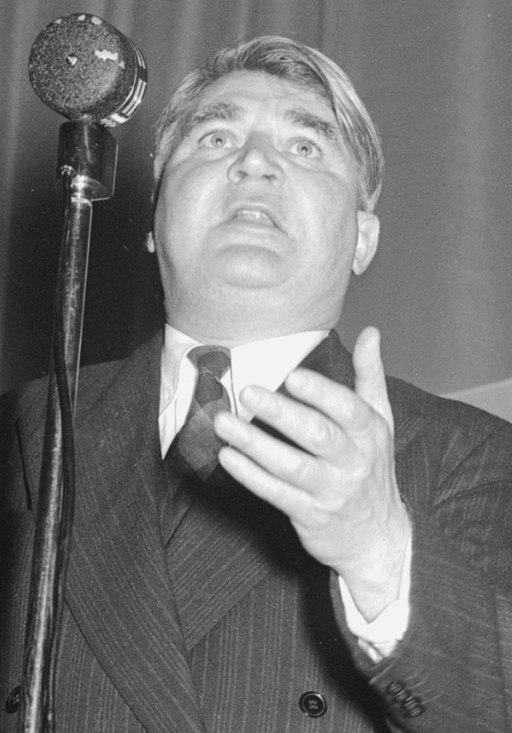Celebrating 70 Years of the NHS: A Look Back at the National 医疗保健 Service from 1948-1990
作者:John Knape
日期
2018年6月29日在国民保健制度建立之前, 在英国,只有向劳合·乔治(当时自由党政府的财政大臣)于1911年设立的国民保险计划缴费的工薪阶层(而不是他们的家属)才能免费获得医疗服务,但仅限于由专业医生治疗,或者只有肺结核患者才能在医院接受治疗.
The country’s hospitals comprised independent voluntary sector institutions, 依赖慈善事业或私人资金, together with municipal hospitals operated by local authorities, 包括许多最初根据《AG平台》设立的机构. 然而, 到30年代末, 越来越多的人一致认为,国家保险制度应扩大到包括家属和, 出于财政可持续性的原因, that the voluntary hospitals needed to be integrated into a single system.

Anenurin Bevan, NHS的创始人. 从图片 维基共享
尽管第二次世界大战推迟了这些变化, it also engendered the national will and impetus to enact them. 战时需要看到中央“紧急医院服务”的实施,这证明了国营系统的有效性, 与此同时,威廉·贝弗里奇在1942年底发表的报告中提议对国家的社会福利制度进行全面改革,以解决社会的“巨大罪恶”——“肮脏”, 无知, 想要, 懒惰和疾病”.
This Report formed the basis of the post-war Welfare State including the establishment, on 5th 1948年7月, 国民保健服务的一部分——在使用点是免费的, 由中央税收资助,为所有人提供“从摇篮到坟墓”的照顾——这是该国现代社会改革中最伟大的成就.
With only about a third of its building stock constructed since the First World War, 很明显,2,国民保健制度继承的000多家医院绝大多数不适合战后不断增长的人口的需要以及医疗和外科实践的进步.
通过20世纪50年代末开始的基本建设计划来解决这些问题的机会,该计划在20年后达到了顶峰, was a ‘golden age’ in the design and delivery of healthcare facilities for the post-war ‘brave new world’.
根据1955年纳菲尔德的出版物 《AG真人试玩网址》, 1962年的“英格兰医院计划”提倡发展新的地区综合医院(DGHs),每个医院有600-800个床位,为大约125人服务,000 (effectively the hospital system we now have today), 由1959年成立的卫生部医院建筑司和1965年成立的北伦敦理工学院医疗建筑研究单位(MARU)提供支持, architects seized the opportunity to apply the wartime lessons of industrial production, 在“现代主义”风格的新医院设计中,预制和模块化协调(主题再次引起共鸣).
在此期间, new concepts were tested such as ‘indeterminate architecture’ (flexible, serviced spaces to suit indeterminate growth and ongoing change), 讲台和塔楼vs低层建筑, “赛马场”病房布局, 中间服务楼层和医院街道, as well as planning arrangements focussed on separating clean and dirty activities. 这些理念最早是在门诊、A等示范科室建设中形成的&利物浦沃尔顿医院急诊室. This was eventually replaced in the mid-1990s by a new A&E facility at Aintree designed by current members of the IBI healthcare team.
第一批主要的战后医院(包括格林威治,还有其他标志性的计划,如斯蒂夫尼奇的那些), 斯文顿, Wexham Park and Northwick Park) complete or under construction, “医院建筑计划”(到1961年,其成本已达到令人眼花缭乱的3100万英镑)正面临严重的财政压力,这一点变得越来越明显.
在回应, 每1个建议的床位数量,000 people was reduced and the Ministry of Health developed a smaller, simplified ‘standard’ DGH known as the “Best Buy” hospital. 基于低层建筑, 简单的结构和水平运动, and essentially suited only to new build developments on flat, 相对不受约束的地点, only two “Best Buy” hospitals were built – at Bury St Edmunds and Frimley Park.
在此期间, some individual Regional Health Boards began developing their own standard solutions, 它的模, prefabricated building system developed by the Oxford Regional Hospital Board was the most advanced. “牛津方法”旨在减少设计和施工时间,同时通过设计和规范标准化的好处提高质量, 施工技术与模块化配合, 并显著, 通过CAD的第一个应用.
到1969年,卫生部 & 社会保障局(DHSS,即卫生部的后继者)医院建筑司已经完成了开发“医院系统”的初步工作. Based on interchangeable standard departments and modern design, constructional and services technology as well as dimensional co-ordination, “Harness” was a much more sophisticated alternative to “Best Buy”. 不像“百思买”模式, “Harness” was suitable for application in a range of locations including existing hospital sites. If it weren’t for the financial and political fallout of the 1973 oil crisis, 多达70家"脊甲"医院可能已经建成. 医院建设计划突然停止,只在斯塔福德和达德利建造了两座医院,这两座医院最近都进行了大规模的翻新.

诺斯威克公园医院,1970年开业. 从图片 维基共享
1975年首都建设计划恢复时, national financial stringency demanded economies in capital and revenue costs. 相应的, HM Treasury imposed the adoption of more modestly sized hospitals, 特殊情况除外, these were to create an initial nucleus of key standardised departments planned at 1,000m2. This template joined them together by a ‘hospital street’ with courtyards between, capable of expansion in line with demand and affordability. 通过减少可接受的空间供应和对所有部门的规划,在有限的占地面积内实现功能, to fit within the standard template – a constraint disparagingly referred to as ‘template tyranny’.
建成了150多个“核心”项目, 最后一次是在上世纪90年代末, 包括DHSS最后的示范医院(这是一项我们今天很难想象的智力和财政承诺)——怀特岛和万贝克的“低能耗”医院. 参与“核心”项目为当前IBI医疗保健团队的一些成员提供了他们在医疗保健设施设计方面的早期经验,同时也为当前团队的一些年轻成员提供了经验, the repurposing of “Nucleus” templates has recently provided a similar initiation.
1979年,玛格丽特•撒切尔(Margaret Thatcher)领导的第一届保守党政府的当选,开始了完全由公共所有和资助的NHS概念的转变, 在英国设计和采购医疗设施的政治和经济背景也发生了变化.
With an innate distaste for the ‘nanny state’ and regulation, 开发和测试公共部门医疗设施设计理论所需的意愿和资源导致NHS地产团队逐渐解散. 该团队最终在2005年工党政府的领导下被废除,数十年来在设计指导方面的智力资本投资(如卫生建筑说明和卫生技术备忘录)也在此时大幅减少.
这篇文章是我们庆祝NHS70的一部分, 庆祝国民医疗保健制度70周年. 点击 在这里 阅读本系列的第二部分.
Lead image: first day of National Health Service on July 5 1944 from 维基共享







